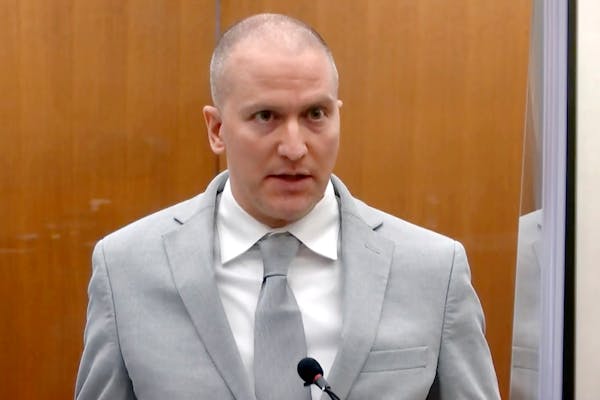Derek Chauvin has survived a stabbing at an Arizona federal prison, law enforcement officials said Saturday, raising immediate questions about why Minnesota's most notorious inmate was vulnerable to attack and what should be done to protect him in the future.
The former Minneapolis police officer has been imprisoned at the Federal Correctional Institution in Tucson for killing George Floyd while on duty in 2020. As of Saturday, the Federal Bureau of Prisons had not formally confirmed Chauvin was attacked by a fellow inmate a day earlier at the medium-security facility, but law enforcement leaders in Minnesota said they were officially notified he was.
A spokesman for Attorney General Keith Ellison, who decried the attack, said Saturday morning that Chauvin was "expected to survive." Brian Evans said Ellison's office had no further information about Chauvin's stabbing, which was being investigated by the FBI.
A spokesperson for the Bureau of Prisons, which like the FBI is under the Justice Department, declined to respond to questions or provide additional details about the attack, what led up to it or where Chauvin was being kept. The bureau said in a statement Friday night that the inmate in question had been taken to a hospital.
"I have not heard from the Bureau of Prisons at all," Chauvin's attorney, William Mohrman, said Saturday. He said his office has tried to the contact the prisons bureau "regarding the media reports of an attack on Mr. Chauvin, and we have not heard anything back."
Chauvin, 47, has been serving a 21-year federal sentence for violating Floyd's civil rights and a 22 ½-year state sentence for second-degree murder. Floyd, who was Black, died in May 2020 while pinned under the knee of Chauvin, who is white, at the corner of Chicago Avenue and 38th Street in south Minneapolis. Floyd's death ignited days of protests and riots.
In August 2022, Chauvin was transferred from Minnesota to the Arizona prison, which has 382 inmates, according to its website. The prison has been plagued by security lapses and staffing shortages, according to the Associated Press.
"He doesn't deserve any extra punishment. I'm upset about this," Ellison said in an interview Friday night after he was briefed on the attack.
One Minnesota corrections official, who declined to speak for attribution, said Chauvin would likely be housed in a special section of any prison — whether in Arizona or Minnesota.
"It would be standard practice that he would be separated from the general population, especially someone who is high profile and especially in a case with national prominence," the corrections official said.
"It's not clear to me how this happened."
Chauvin's attorneys long advocated for separating him from the general population to protect his safety.
While awaiting sentencing, he was kept in solitary confinement for more than six months at Oak Park Heights prison, Minnesota's high-security prison.
Senior U.S. District Judge Paul Magnuson, who issued Chauvin's federal sentence, said he had intended to request that Chauvin be imprisoned at a location close to family members in Iowa and Minnesota. But Magnuson acknowledged it was not his final decision to make, and Chauvin ended up in Tucson.
On Monday, the U.S. Supreme Court declined to hear Chauvin's latest attempt to vacate his murder conviction. The week before that, Chauvin separately argued in court filings that he would not have pleaded guilty in his federal case if his then-attorney had informed him that a pathologist had offered to testify that Chauvin didn't cause Floyd's death.
The facility housing Chauvin is part of a federal correctional complex in Tucson that includes a high-security prison and a minimum-security camp. In November 2022, an inmate at the prison camp reportedly obtained a gun and tried to shoot a visitor in the head.
Chauvin is the latest high-profile inmate to be attacked at a federal prison. In July, convicted sex offender and former Michigan State University doctor Larry Nassar was stabbed repeatedly at a facility in Florida.
In 2018, former Boston mob boss James "Whitey" Bulger was killed shortly after being transferred to a federal prison in West Virginia. A Justice Department report late last year excoriated the West Virginia prison's management for Bulger's death.
A series of Associated Press reports in 2022 found that the Federal Bureau of Prisons has long been plagued by staffing shortages, chronic violence, inmate deaths and sexual abuse of prisoners by staff.
Star Tribune staff writer Rochelle Olson contributed to this report.
New Minnesota GOP leaders seek peace with party's anti-establishment wing

Who is Republican Lisa Demuth, Minnesota's first House speaker of color?

Minnesota House GOP, Secretary of State Steve Simon return to Supreme Court
Supreme Court sides with DFL and Simon, says 68 House members needed for floor action

